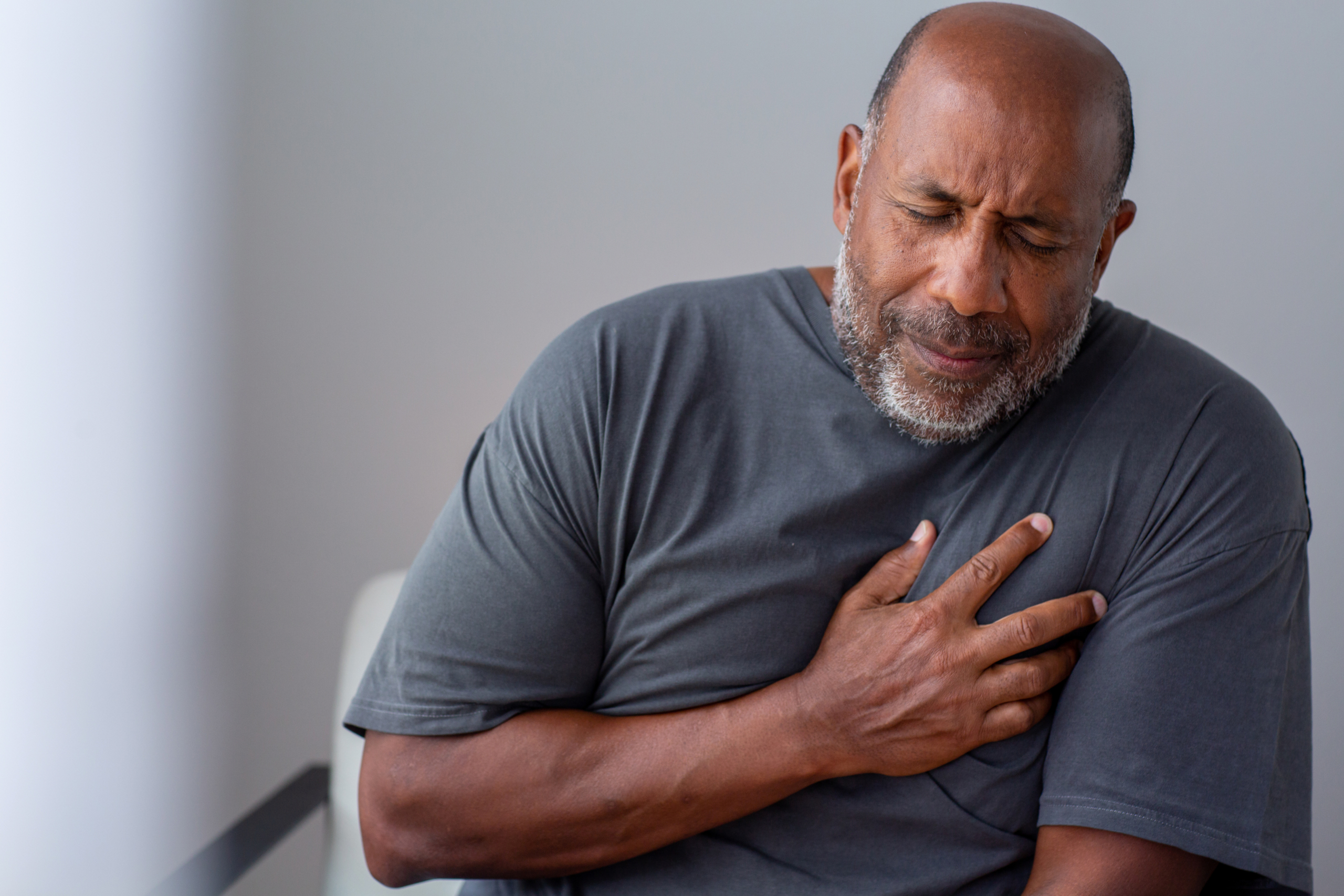When we talk about heart disease, you might automatically think of conditions like heart attacks and heart failure. But conditions that affect the rhythm and pace of your heart beat are also important to be mindful of, as NFL player Damar Hamlin’s recent experience with arrhythmia reminds us.1
The word “arrhythmia” literally means “without rhythm.” If a person has a heart arrhythmia, it means their heart beats too slow, too fast, or irregularly. In this article, you’ll learn about 7 different types of arrhythmias including atrial fibrillation, one of the most common types.
How does a heartbeat happen?
Before diving into arrhythmias, let’s take a step back to briefly recap how the heart works.
Your heart has four chambers. You can think of those chambers as hollow sections that separate the heart into four distinct spaces — two on top and two on the bottom. The top chambers are called atria (singular: atrium), and the bottom chambers are called ventricles.2
Each atrium is separated from the ventricle below it by a valve. Valves open and close to let blood pass through. When valves close, this produces the sound that a doctor or other health professional hears when they listen to your heart beat.3 Blood flows in a specific pattern through your atria and ventricles, and the valves help make sure blood flows in the right direction.
Learn more about how blood flows through your heart and the rest of your body.4
Electrical currents cause your heart to beat and determine the pace or rhythm of your heart. You may have heard of a friend or family member having a pacemaker to help their heart. Well your heart has a natural pacemaker called the SA node.4,5 This SA node, located in an atrium, sends out the electrical impulses that tell your heart to beat at a certain pace and rhythm. A normal resting heart rate for most healthy adults is between 60 and 100 beats per minute.6
What causes heart arrhythmias?
Most arrhythmias happen when there’s a problem with the electrical signals that cause the heart to beat. The following factors can increase your risk of developing a heart arrhythmia7,8:
- Past heart attacks
- A history of smoking
- Family history of arrhythmias
- Heart defects at birth
- Stress
- Chronic health conditions like other heart and blood vessel diseases, kidney disease, lung disease, obesity, sleep apnea
If you’re at high risk for an arrhythmia then there are several situations that can “trigger” an arrhythmia by causing your heart to work harder, like8:
- Experiencing low or high blood sugar
- Drinking caffeine
- Being dehydrated
- High physical activity
- High stress or sudden emotions (like surprise or anger)
7 Types of Heart Arrhythmias to Know About
Heart arrhythmias can be divided into tachycardias (heart beats too fast) and bradycardias (heart beats too slow). Below are several types you should know about.
Tachycardias (pronounced: tack-uh-car-dee-uhs): Heart arrhythmias where the heart beats too fast
Atrial fibrillation (AFib) – Atrial fibrillation is the most common type of heart arrhythmia and happens when the heart’s atria beat off-rhythm and faster than normal.9 Some people with AFib also have tachy-brady syndrome, where the heart sometimes beats too fast and sometimes beats too slow.
AFib can increase your chances of having a stroke. While AFib is more common amongst white people than in Black communities, Black individuals are more susceptible to some of the risk factors that increase the likelihood of developing AFib, such as high blood pressure, diabetes, and heart failure.10
AFib is responsible for 1 in every 7 strokes.10 That’s because arrhythmias like AFib can lead to blood clots in the heart. Blood clots can block the brain’s blood and oxygen supply, which can cause strokes.
Atrial flutter – Atrial flutter happens when the heart’s atria beat too fast. This results in a heartbeat that’s usually regular, but faster than it should be. Atrial flutter usually occurs in people who are past age 50, but folks who’ve had heart surgery before are also at increased risk.11 Like AFib, atrial flutter can also increase the risk of a stroke.
Atrial tachycardia (AT) – Much like AFib and atrial flutter, atrial tachycardia is a fast heartbeat. The difference is that the electrical impulse that causes the fast heartbeat doesn’t start from the heart’s normal electrical area, the SA node. Instead, electric signals come from a random focus point in the atrium, which hijacks the heart’s normal electrical currents and continues to fire over and over.12 This keeps the heart from beating correctly. AT can sometimes cause AFib.13
Ventricular tachycardia (V-tach) – In V-tach, a person’s heartbeat is faster than it should be, and the issue starts in the ventricles — the bottom chambers. People with a weakened heart muscle (known as cardiomyopathy), heart failure, a heart infection (myocarditis), or valvular heart disease may experience V-tach. V-tach can also happen as a result of a heart attack or after heart surgery.14
One specific type of V-tach called Torsades de Pointes (pronounced: tor-sahdz duh point) can happen as a side effect of certain medications or due to congenital heart disease.15 Examples of medicines that can cause Torsades include16:
- Some antifungals, like fluconazole (Diflucan)
- Some antibiotics, like azithromycin (Zithromax, Z-Pak) & metronidazole (Flagyl)
- Some antipsychotics, like ziprasidone (Geodon) & quetiapine (Seroquel)
- Some antiarrhythmics, like dofetilide (Tikosyn) & amiodarone (Pacerone)
- Some antidepressants, like amitriptyline (Elavil) & citalopram (Celexa)
Ventricular fibrillation (VF) is one of the most dangerous types of arrhythmia. It is life-threatening because when it happens, the ventricles don’t pump. Instead they merely quiver or twitch.17 During VF, blood does not get pumped out of the heart and into the rest of the body, which can be life-threatening and lead to sudden cardiac death.18
A direct blow to the chest during a football game may have caused NFL player Damar Hamlin to experience a rare heart event called commotio cordis, sending his heart into VF, followed by cardiac arrest. Fortunately, medical staff were able to restore his heartbeat on the field.1
Bradycardias (pronounced: bray-duh-car-dee-uhs): Heart arrhythmias where the heart beats too slow
Sinus bradycardia is a simple type of bradycardia that happens when a person’s heart beat is less than 60 beats per minute. In many cases, sinus bradycardia doesn’t cause problems. In fact, many athletes have a slow heart rate. But if the heart rate is less than 40 beats per minute, a person may notice symptoms and might need treatment.19
Heart block, or AV block, happens when the electrical impulses that set the pace of the heart are interrupted, or blocked. In most cases, the electrical signals slow down rather than stopping all together, but there are levels to the severity. First-degree heart block happens when signals slow down, but in third-degree heart block, the signals do not pass at all, which can result in no pulse.20
If you’re at high risk for an arrhythmia, talk to your doctor about ways you can lower your risk. If you have been diagnosed with a heart arrhythmia, talk to your doctor about ways to prevent arrhythmias from kicking in. Avoiding triggers as much as possible and keeping other chronic diseases under control is a great start.
Conversation starters:
- Which of these types of arrhythmia have you heard of before?
- Do you know of anyone with a pacemaker?
References:
- Treisman, R. (2023, January 3). Did Damar Hamlin experience commotio cordis? What to know about the rare phenomenon: Expert [Radio broadcast]. NPR. https://www.npr.org/2023/01/03/1146744819/damar-hamlin-buffalo-bills-cardiac-arrest-commotio-cordis
- Medical News Today. The Heart: All you need to know. https://www.medicalnewstoday.com/articles/320565
- MedlinePlus. Heart beat. https://medlineplus.gov/ency/imagepages/19613.htm
- Cleveland Clinic. Blood Flow Through the Heart. https://my.clevelandclinic.org/health/articles/17060-how-does-the-blood-flow-through-your-heart
- New York-Presbyterian Hospital Health Library. SA Node and AV Node. https://www.nyp.org/healthlibrary/definitions/sa-node-and-av-node
- Harvard Health Publishing. What your heart rate is telling you. https://www.health.harvard.edu/heart-health/what-your-heart-rate-is-telling-you
- MedlinePlus. Arrhythmia. https://medlineplus.gov/arrhythmia.html
- National Institutes of Health – National Heart, Lung, and Blood Institute. Arrhythmias: Causes and Triggers. https://www.nhlbi.nih.gov/health/arrhythmias/causes
- NHS. Arrhythmia. https://www.nhs.uk/conditions/arrhythmia/
- Centers for Disease Control and Prevention. Atrial Fibrillation. https://www.cdc.gov/heartdisease/atrial_fibrillation.htm
- Johns Hopkins Medicine. Atrial Flutter. https://www.hopkinsmedicine.org/health/conditions-and-diseases/atrial-flutter
- Washington Heart Rhythm Associates. Atrial Tachycardia. https://www.washingtonhra.com/arrhythmias/atrial-tachycardia.php
- Johns Hopkins Medicine. Atrial Tachycardia. https://www.hopkinsmedicine.org/health/conditions-and-diseases/atrial-tachycardia
- Mayo Clinic. Ventricular tachycardia. https://www.mayoclinic.org/diseases-conditions/ventricular-tachycardia/symptoms-causes/syc-20355138
- MedlinePlus. Ventricular tachycardia. https://medlineplus.gov/ency/article/000187.htm
- Farzam K, Tivakaran VS. QT Prolonging Drugs. [Updated 2022 Jul 20]. In: StatPearls [Internet]. Treasure Island (FL): StatPearls Publishing; 2022 Jan-. Available from: https://www.ncbi.nlm.nih.gov/books/NBK534864/
- MedlinePlus. Ventricular fibrillation. https://medlineplus.gov/ency/article/007200.htm
- Cleveland Clinic. Ventricular fibrillation. https://my.clevelandclinic.org/health/diseases/21878-ventricular-fibrillation#symptoms-and-causes
- New York-Presbyterian Hospital Health Library. Types of Bradycardia. https://www.nyp.org/healthlibrary/articles/types-of-bradycardia
- Johns Hopkins Medicine. Heart block. https://www.hopkinsmedicine.org/health/conditions-and-diseases/heart-block



